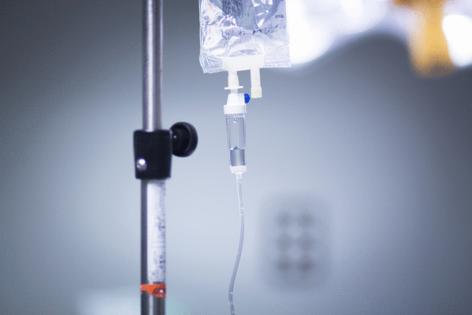Hospitals around US move to conserve IV fluids amid hurricane disruptions
Published in Weather News
Hospitals throughout the nation are taking steps to conserve intravenous fluids that have been in short supply since Hurricane Helene flooded a key North Carolina production plant.
After the storm shut down a facility near Asheville, North Carolina, operated by Baxter International — producer of more than 60% of IV solutions used in the U.S. — the company began limiting what customers can order and declined new customers. Baxter is the country’s largest supplier of IV solutions commonly used to treat and prevent dehydration in patients both in emergency rooms and during surgeries.
Though the outlook improved somewhat on Wednesday, when the manufacturer said it has boosted capacity at other plants and slightly increased allocations, medical facilities are planning for extended disruptions, taking measures such as forming special task forces and looking for new vendors.
Officials at the University of Maryland Medical System said they are “actively monitoring” supply chain impacts from Hurricane Helene, including damage to the Baxter plant.
“At this time, there are no identified impacts to patient care,” Michael Schwartzberg, a spokesman for UMMS, said. “UMMS has secured vendors to provide an additional supply of our most critical supplies and has also identified clinical management options and best practices that could be implemented should we face continuing supply constraints.”
In addition, the medical system said it launched a “supply chain disruption” task force to manage the situation’s uncertainties.
Elsewhere, hospitals have responded by delaying or rescheduling non-emergency procedures, one health care analyst said.
“Hospitals are beginning to curtail elective procedures and are reporting allocations,” Matthew Taylor, an equity analyst with Jefferies said in a report Wednesday.
Hospitals are conserving fluids by closely managing solutions given intravenously to patients, he said. That can include more tightly controlling dosage, duration and flow rate.
On Monday, the American Hospital Association had urged President Joe Biden to declare a shortage and take steps to increase supplies by invoking emergency powers.
“Our members are already reporting substantial shortages of these lifesaving and life-supporting products,” Richard J. Pollack, the group’s CEO and president, said in the letter. “Patients across America are already feeling this impact, which will only deepen in the coming days and weeks unless much more is done to alleviate the situation and minimize the impact on patient care.”
The Baxter site in Marion, North Carolina, which employs more than 2,500 workers, ceased operations on Sept. 29 in the aftermath of the hurricane, which left the facility covered in mud. The company reported Wednesday that it was shifting inventory to meet critical needs and that it hoped to return to near full production by year’s end.
“We are also increasing high concentration dextrose and sterile water for injection allocations and expect to be in a position to make additional increases for certain product codes by early November,” Baxter officials said in a statement.
In a letter Wednesday, Xavier Becerra, secretary of the Department of Health and Human Services, said supply may be constrained in coming weeks and urged health care leaders and stakeholders to “implement product conservation strategies” to keep patients safe and maximize supply.
“We understand these circumstances are hard for many providers and healthcare systems,” Becerra said in the letter. “We ask for your partnership at this critical time.”
Helene’s aftermath has led to shortages of blood donations, too.
Scott Marder, a spokesman for the American Red Cross in the National Capital & Greater Chesapeake Region, said about 100 blood drives in states hit by Helene had been canceled, leading to the loss of about 2,500 expected donations.
That’s significant, he said, because the Red Cross provides about 40% of the nation’s blood supply.
“The need for blood is constant,” he said. “It’s not just because there’s a hurricane. People are having surgery every day. Car accidents happen. Mothers have complications during childbirth.
“When there’s any dip in the blood supply anywhere, it has to be made up in some way so that everybody who needs blood can get it,” he said, urging residents in the Baltimore-area and other areas not experiencing the impact from recent storms to donate blood.
With Hurricane Milton bearing down on Florida, the region already has shipped several hundred units of blood to hospitals in areas expected to be hit by the storm.
“Because we supply blood nationally, we can ship it to different locations, depending on need,” he said.
________
©2024 Baltimore Sun. Visit baltimoresun.com. Distributed by Tribune Content Agency, LLC.







Comments